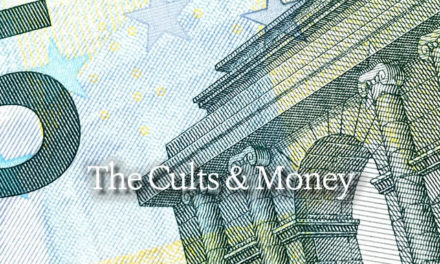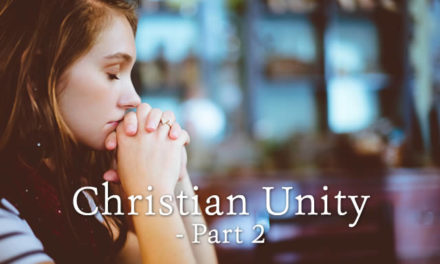Do the Bible and modern psychology agree or disagree about the source of behavioral changes? In Romans 12:2 we read very clearly that we are to be “transformed by the renewing of the mind…” It also tells us in John 8:32 that “and you will know the truth, and the truth will make you free.” It is from the Bible that we know that knowledge of the truth is the foundation of our character and behaviors. Does modern psychology agree or disagree with that?
“Cognitive dissonance theory has a long and esteemed history in social psychology. As originally formulated (Festinger, 1957), cognitive dissonance is induced when a person holds two contradictory beliefs, or when a belief is incongruent with an action that the person had chosen freely to perform. Because this situation produces feelings of discomfort, the individual strives to change one of the beliefs or behaviors in order to avoid being inconsistent. Hypocrisy is a special case of cognitive dissonance, produced when a person freely chooses to promote a behavior that they do not themselves practice.” Cognitive Dissonance Theory by Joel Cooper, page 377.
Leon Festinger outlined three elements involved in dissonance theory, behavior, thoughts and emotions. Later Steven Hassan, a counter-cult researcher and counselor added the element of information. Hassan knew from his own experience in a cult that information presented to him shaped his decision-making about involvement with the cult. The four elements then are behavior, information, thoughts and emotions. These four elements can be remembered by the acronym BITE.
Those four elements can be further summarized into two categories Information and Thoughts are the rational side of human personality and Behaviors and Emotions are the affective side of personality.
Information and thoughts are two sides of the same thing. Any thought must necessarily involve information. Both biblically and psychologically, our thoughts are the central element of our being.
Scripture agrees with this when it says in Romans 12:2 “And do not be conformed to this world, but be transformed by the renewing of your mind, so that you may prove what the will of God is, that which is good and acceptable and perfect.”
Many other scriptures focus on our thoughts and mind as foundational to our behaviors and emotions.
Proverbs 1:29, “Because they hated knowledge, and did not choose the fear of the LORD:”
Proverbs 23:7, “For as he thinks within himself so he is:…”
Matthew 13:22, ”And the one on whom seed was sown among the thorns; this is the man who hears the word, and the worry of the world, and the deceitfulness of riches choke the word, and it becomes unfruitful.”
Ephesians 4:23, ”…and that you be renewed in the spirit of your mind;”
Ephesians 4:24, ”…and put on the new self, which is the likeness of God has been created in righteousness and holiness of the truth.”
Ephesians 5:17, ”So then do not be foolish, but understand what the will of the Lord’s is.”
Colossians 1:9, ”For this reason also, since the day we heard of it, we have not ceased to pray for you and to ask that you may be filled with the knowledge of his will in all spiritual wisdom and understanding.”
Colossians 3:10, ”…and have put on the new self who is being renewed to a true knowledge according to the image of the One who created him.”
1 Peter 1:14, ”As obedient children, do not be conformed to the former lusts which were yours in your ignorance.”
Behaviors and emotions are shaped primarily by our thoughts and the information we take in to inform our thoughts. Solomon said, “For as he things within himself so is he” Proverbs 23:7. Our thinking guides our behaviors. How we interpret the world we live in guides the way we relate to it. Our thoughts are the locomotive pulling the train of our behaviors and emotions. If we move away from the information source that informs our thoughts then we will inevitably change our emotions and behaviors to agree with that new worldview.
Thoughts and information are primary but they can be seriously affected by conflict involving behaviors or emotions. Though our thoughts are the locomotive of our being they can be swayed away from the foundational worldview. Any of the four BITE elements can become the element of the other three and draw us into cognitive dissonance. For instance, many Christians have left their faith because of an emotional struggle that caused them to question God. A common question is “Where was God when I needed Him?” That emotional struggle can introduce the cognitive dissonance that wedges the mind away from God and the Bible.
Such a disillusioning experience challenges a person’s sense of well being and hope. It also impacts one’s ability to trust that the future will be better than the present. During such an emotional low point a cult can gain audience because they offer hope and perspective on the traumatic experience. Well-being, trust and hope are the currency of daily living.
Once that dissonance begins, there is an internal struggle to resolve it. Confusion, doubt, questioning, and a serious search for solutions will characterize such a struggle. If the primary resources of thoughts/information are not sufficient to resolve the conflict then the behaviors and emotions will drag thoughts and information over to them by some rationalizing so as to resolve the conflict. When the dissonance is removed the person will regain that sense of well being, trust and hope. Whether that hope is based on truth is another question.
The scenario above describes how cults gain converts. The two main elements of cult recruitment are information (Bible, doctrine, history, prophecy), and the sense of community within the cult. It is no accident that one of the cult recruitment techniques is called “love bombing.” They cult provides the two elements, information and emotions, necessary to move the person away from the beliefs and into the cult worldview.
When a cult recruits a new member there will frequently be a period of time when the recruit is excited about his new community and his new knowledge. However, when that recruit many years later finds that he was deceived, removing himself from the cult can be very traumatic. Relationships are broken which are very painful, especially when it involves family. Emotional struggles such as this has even led some to seek counseling, to be hospitalized for psychological treatment, or even to commit suicide.
I once had a chance to meet with a young lady who was studying with a cult. She was studying with them not to learn the Bible because she knew they were wrong. But she just enjoyed Bible study and the cultists came for free. I asked her some doctrinal questions and her answers revealed that she was indeed ingesting their false doctrine. When I pointed that out to her, she was alarmed. She soon broke off the study. She was being drawn toward the cult because she was not able to discern that the information she was receiving was false. The tool for recruitment was information that began to shape her thoughts. If that process had not been arrested, she would later have brought her behaviors and emotions in line with that information, i.e., she would have joined the cult.
Such a disillusioning experience challenges a person’s sense of well being and hope. It also impacts one’s ability to trust that the future will be better than the present. During such an emotional low point, a cult can gain audience because they offer hope and perspective on the traumatic experience. Well-being, trust and hope are the currency of daily living.
Jeanne Mills was a survivor of the People’s Temple Jonestown mass murder/suicide. She said, “When you meet the friendliest people you have ever known, who introduce you to the most loving group of people you’ve ever encountered, and you find the leader to be the most inspired, caring, compassionate and understanding person you’ve ever met, and then you learn that the cause of the group is something you never dared hope could be accomplished, and all of this sounds too good to be true, it probably is too good to be true! Don’t give up your education, your hopes and ambitions, to follow a rainbow.”
Jeanne Mills is talking about the emotional attraction of an image being presented to her by Jim Jones. But another formative element of recruitment is behaviors. This includes all the activities of the recruiter that the recruit accepts without critical thought. Steven Hassan mentioned this in a conversation with an ex-cult member who described prayer in the cult. Hassan drew attention to the simple agreement to fold one’s hands, bow their head and close their eyes as the beginning of a behavioral acceptance of the cult.
A potential recruit who accompanies the cult recruiter in his religious “service” is behaving like the cultist. This “behavior” will make the transition to becoming a committed cultist much closer than just the information received in study. One of the elements holding some cults back from growth is the Internet. When someone is approached by a cult here in the USA, he is much more likely to “Google” the group and find alarming news about them.
When cult members exit their cult, one of the first casualties is trust. They have completely invested themselves in the group only to find out they were deceived. From that point on trust is not a “credit” that is extended easily. Trust goes forward on a “cash only” basis until being credit-worthy is established. Mark Twain made the comment that “A cat that walks on a hot stove will never walk on a hot stove again. But it will not walk on a cold stove either.” This is why many ex-cult members go into a religious limbo, or spiritual “no mans land.” Organized religion has lost their trust. From a Christian perspective, what has happened is expressed in the scripture at Jeremiah 17:9 that says, “The heart is more deceitful than all else and is desperately sick; who can understand it?” Religious groups and teachers must be examined just as thoroughly as used car salesmen.
New recruits to totalistic groups experience “thought reform” as the starting point in behavior modification. It begins with acceptance of a totally new premise underlying the cult worldview. That premise could be that all of current Christianity is apostate necessitating a restoration. Or, it could be that God only speaks to and through a particular chosen leader and you must listen to him to hear God. This premise then is the foundation that must be laid for the acceptance of the teachings and practices espoused by the group. If you have accepted the premise, then follow-through on the secondary teachings and lifestyle practices must follow or the recruit will be in a continual state of cognitive dissonance.
The antidote to this process is truth, unimpeachably presented. When a cultist sees the truth as truth, then the same process by which he was recruited begins to set him free. He doesn’t want to be a hypocrite, after all.
How we interpret the world we live in is crucial to spiritual and emotional health. Our basis for knowledge must be something that has survived the test of time with good results. All the worlds’ religions have their prescriptions for life, but they can’t compare to the results of a Biblical worldview. The Bible gives us a very realistic description of man and the world we live in. It presents us a model in Jesus Christ that cannot be matched in any other religion. The good results of character, deeds, influence, and reputation can be traced back to that Biblical foundation. One of the most important elements of control in a cultic environment is control of information. If the cult says you can’t understand the Bible without the cult’s teachings, flee. Your eternal life is at stake.
The Apostle John said, “As for you, the anointing which you received from Him abides in you, and you have no need for anyone to teach you; but as His anointing teaches you about all things, and is true and is not a lie, and just as it has taught you, you abide in Him.” 1 John 2:27
G.K. Chesterton and George MacDonald were two of the most influential writers to effect C.S. Lewis’ conversion. He writes in his autobiography, Surprised By Joy:
“In reading Chesterton, as in reading MacDonald, I did not know what I was letting myself in for… A young man who wishes to remain a sound Atheist cannot be too careful of his reading.”
By David Henke






